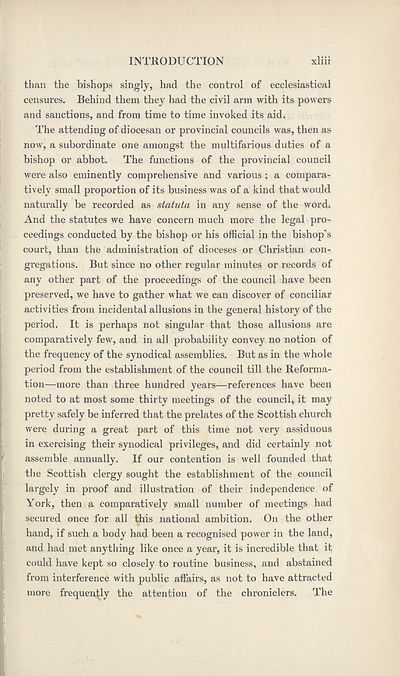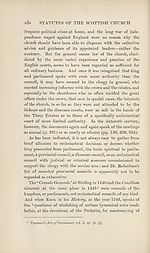Series 1 > Statutes of the Scottish Church, 1225-1559
(48) Page xliii
Download files
Complete book:
Individual page:
Thumbnail gallery: Grid view | List view

INTRODUCTION
xliii
than the bishops singly, had the control of ecclesiastical
censures. Behind them they had the civil arm with its powers
and sanctions, and from time to time invoked its aid.
The attending of diocesan or provincial councils was, then as
now, a subordinate one amongst the multifarious duties of a
bishop or abbot. The functions of the provincial council
were also eminently comprehensive and various ; a compara¬
tively small proportion of its business was of a kind that would
naturally be recorded as statuta in any sense of the word.
And the statutes we have concern much more the legal pro¬
ceedings conducted by the bishop or his official in the bishop’s
court, than the administration of dioceses or Christian con¬
gregations. But since no other regular minutes or records of
any other part of the proceedings of the council have been
preserved, we have to gather what we can discover of conciliar
activities from incidental allusions in the general history of the
period. It is perhaps not singular that those allusions are
comparatively few, and in all probability convey no notion of
the frequency of the synodical assemblies. But as in the whole
period from the establishment of the council till the Reforma¬
tion—more than three hundred years—references have been
noted to at most some thirty meetings of the council, it may
pretty safely be inferred that the prelates of the Scottish church
were during a great part of this time not very assiduous
in exercising their synodical privileges, and did certainly not
assemble annually. If our contention is well founded that
the Scottish clergy sought the establishment of the council
largely in proof and illustration of their independence of
York, then a comparatively small number of meetings had
secured once for all this national ambition. On the other
hand, if such a body had been a recognised power in the land,
and had met anything like once a year, it is incredible that if
could have kept so closely to routine business, and abstained
from interference with public affairs, as not to have attracted
more frequently the attention of the chroniclers. The
xliii
than the bishops singly, had the control of ecclesiastical
censures. Behind them they had the civil arm with its powers
and sanctions, and from time to time invoked its aid.
The attending of diocesan or provincial councils was, then as
now, a subordinate one amongst the multifarious duties of a
bishop or abbot. The functions of the provincial council
were also eminently comprehensive and various ; a compara¬
tively small proportion of its business was of a kind that would
naturally be recorded as statuta in any sense of the word.
And the statutes we have concern much more the legal pro¬
ceedings conducted by the bishop or his official in the bishop’s
court, than the administration of dioceses or Christian con¬
gregations. But since no other regular minutes or records of
any other part of the proceedings of the council have been
preserved, we have to gather what we can discover of conciliar
activities from incidental allusions in the general history of the
period. It is perhaps not singular that those allusions are
comparatively few, and in all probability convey no notion of
the frequency of the synodical assemblies. But as in the whole
period from the establishment of the council till the Reforma¬
tion—more than three hundred years—references have been
noted to at most some thirty meetings of the council, it may
pretty safely be inferred that the prelates of the Scottish church
were during a great part of this time not very assiduous
in exercising their synodical privileges, and did certainly not
assemble annually. If our contention is well founded that
the Scottish clergy sought the establishment of the council
largely in proof and illustration of their independence of
York, then a comparatively small number of meetings had
secured once for all this national ambition. On the other
hand, if such a body had been a recognised power in the land,
and had met anything like once a year, it is incredible that if
could have kept so closely to routine business, and abstained
from interference with public affairs, as not to have attracted
more frequently the attention of the chroniclers. The
Set display mode to:
![]() Universal Viewer |
Universal Viewer | ![]() Mirador |
Large image | Transcription
Mirador |
Large image | Transcription
Images and transcriptions on this page, including medium image downloads, may be used under the Creative Commons Attribution 4.0 International Licence unless otherwise stated. ![]()
| Scottish History Society volumes > Series 1 > Statutes of the Scottish Church, 1225-1559 > (48) Page xliii |
|---|
| Permanent URL | https://digital.nls.uk/126917562 |
|---|
| Attribution and copyright: |
|
|---|
| Description | Over 180 volumes, published by the Scottish History Society, containing original sources on Scotland's history and people. With a wide range of subjects, the books collectively cover all periods from the 12th to 20th centuries, and reflect changing trends in Scottish history. Sources are accompanied by scholarly interpretation, references and bibliographies. Volumes are usually published annually, and more digitised volumes will be added as they become available. |
|---|


